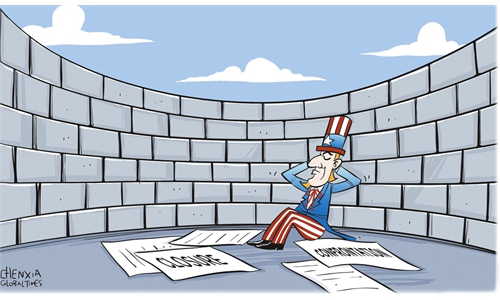Growing 'China threat list' a self-entertained political show for some US politicians

Illustration: Chen Xia/GT
From garlic to cranes, EVs to drones - some US politicians' "China threat list" just got longer, with solar inverters and routers recently added. Ironically, the router in question is even neither from a Chinese company nor "made in China."One of the latest news stories is that "rogue" devices were reportedly found in Chinese solar inverters. On Thursday, Reuters quoted anonymous US sources as saying, "The rogue components … could allow firewalls to be circumvented remotely, with potentially catastrophic consequences," such as destabilizing power grids, damaging energy infrastructure, and triggering widespread blackouts. However, the entire report is built on speculation and assumptions without providing any solid proof.
Another eye-catching news story is from Bloomberg, which reported that "Senator Tom Cotton of Arkansas, a China hawk, as well as 16 senators and representatives wrote a letter to Commerce Secretary Howard Lutnick on Wednesday accusing TP-Link of deep ties to China's ruling Communist Party and calling the company a 'clear and present danger.'" Furthermore, the lawmakers have pushed for the prohibition of TP-Link equipment, citing its "links to China.''
However, the company issued a statement, claiming, "As a US company, no foreign country or government - including China - has access to or control over the design and production of our products."
A closer look at this farce reveals a crucial point: The company that appeared in US reports and is targeted by some US politicians is a separate US entity. Its full name is TP-Link Systems and is headquartered in Irvine, California. According to its official website, since 2024, TP-Link Systems has split from TP-LINK Technologies Co, Ltd, which was established in 1996 in Shenzhen, and no longer has any affiliation with it. Despite having similar names, these companies have entirely different ownership, management, and operations.
Despite the two being legally independent entities, TP-Link Systems Inc firmly emphasizing its identity as an "American company," as well as the fact that the company has been manufacturing its US-bound products in its own factory in Vietnam since 2018, it still cannot escape the "presumption of guilt" from the US.
In April, Bloomberg reported that US authorities were conducting a criminal antitrust investigation into pricing strategies by router maker TP-Link Systems Inc and the national security risks associated with its growing market share.
Most observers believe the root of the problem may lie in the company's historical ties to China. Some American politicians are less concerned with whether there are real security threats than with opportunistically portraying themselves as tough-on-China hardliners.
The "China threat list" has grown increasingly absurd: garlic as a poison, cranes as spy devices, and EVs as data thieves. Now, even solar panels and routers are under scrutiny - despite the lack of evidence and the fact that the questioned routers are US-branded and not manufactured in China. Are screwdrivers with Chinese components next, to be dissected in search of phantom "Trojan horses"?
Some US politicians fail to realize that China is mainly focused on its development and has no desire to hurt the US. These politicians need to understand one simple truth: Fundamentally, both the US and China aim to improve their people's lives. And these goals are not contradictory. Inventing baseless "threats" is nothing but a self-deluding farce and will ultimately backfire.



